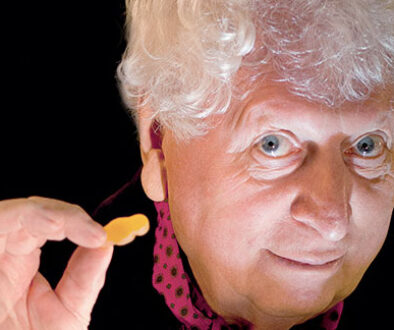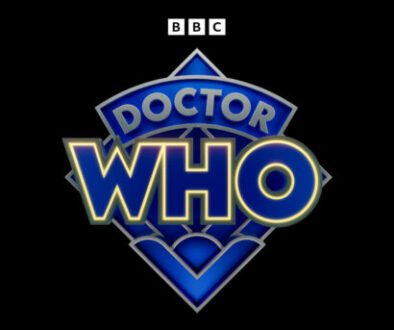Series 1-7 Face-Off Results: Everything Else (Episodes 9-13, Specials)
Across March and April Doctor Who TV pitted all the revival episodes so far against each other and asked you to vote on each. We’ve revealed your choices for both the Dream and Nightmare Run, now to wrap up it’s time to look at everything inbetween.
Catch-up on other articles:
- Nightmare Run (Episodes 1-8)
- Nightmare Run (Episodes 9-13, Specials)
- Dream Run (Episodes 1-8)
- Dream Run (Episodes 9-13, Specials)
- Everything Else (Episodes 1-8)
Now join Mark McCullough as he examines the secomd half of episodes in the list.
NB: Having already looked at first and last place in each of the episode categories, there is no point in talking about them again. Instead I will focus on the five episodes which make up the middle of each set of results. Also, this time we have the percentage splits for each of the episodes so we can see how certain episodes fared. So without further ado:
Episode Nine
 The three two-parters conclude here and in an unexpected twist, The Empty Child usurps all three. Of course all four episodes are fantastic and equally deserving of doing well in the poll. What is actually quite interesting is when we look at the concluding parts of the story and compare them. The Family of Blood keeps a reasonably constant share of the vote yet manages to improve its position in relation to the others. The Forest of the Dead drops a place and a large share of its vote, whilst The Satan Pit does similarly to its predecessor. What this means is rather unclear, was the quality of the episodes different between each part? Or is it just a case of another good episode added to the mix? The remaining three episodes on the list are unsurprising, given its predecessor’s place on the list; Cold Blood was never going to do well. Hide does alright, but probably suffers from its ending and not quite delivering on the fear factor. As revealed in the Nightmare Run, Night Terrors aptly takes the bottom spot.
The three two-parters conclude here and in an unexpected twist, The Empty Child usurps all three. Of course all four episodes are fantastic and equally deserving of doing well in the poll. What is actually quite interesting is when we look at the concluding parts of the story and compare them. The Family of Blood keeps a reasonably constant share of the vote yet manages to improve its position in relation to the others. The Forest of the Dead drops a place and a large share of its vote, whilst The Satan Pit does similarly to its predecessor. What this means is rather unclear, was the quality of the episodes different between each part? Or is it just a case of another good episode added to the mix? The remaining three episodes on the list are unsurprising, given its predecessor’s place on the list; Cold Blood was never going to do well. Hide does alright, but probably suffers from its ending and not quite delivering on the fear factor. As revealed in the Nightmare Run, Night Terrors aptly takes the bottom spot.
Episode Ten
 This was a really strong group of episodes, which all lost out on a spot in the Dream Run, due to the inclusion of the fan favourite, Blink in the poll. Vincent and the Doctor is a fantastic episode, exploring the mind of one of the greatest painters in history. It features some incredible scenes, but none quite as memorable as watching Vincent hearing the Curator speak about his work. Midnight is also a classic making use of the claustrophobic conditions and an unknown threat for tension. The episode has a strong focus on humanity and how far normal people will go under pressure. Then we have The Girl Who Waited, the narrative separates the Doctor from Amy placing them both in different time streams. This results in the heart-breaking choice of an older Amy or the younger version. It is a wonderfully poignant episode. The Doctor Dances fares worse than the opening part of its story, again the reason why is unclear. Perhaps the format of the poll even had a part to play. Journey to the Centre of the TARDIS is an episode which promised a lot and failed to live up to it. Coupled with that the dismal guest cast, and it is no surprise that it features near the bottom of this list, I actually believe it deserves last place more than Love & Monsters.
This was a really strong group of episodes, which all lost out on a spot in the Dream Run, due to the inclusion of the fan favourite, Blink in the poll. Vincent and the Doctor is a fantastic episode, exploring the mind of one of the greatest painters in history. It features some incredible scenes, but none quite as memorable as watching Vincent hearing the Curator speak about his work. Midnight is also a classic making use of the claustrophobic conditions and an unknown threat for tension. The episode has a strong focus on humanity and how far normal people will go under pressure. Then we have The Girl Who Waited, the narrative separates the Doctor from Amy placing them both in different time streams. This results in the heart-breaking choice of an older Amy or the younger version. It is a wonderfully poignant episode. The Doctor Dances fares worse than the opening part of its story, again the reason why is unclear. Perhaps the format of the poll even had a part to play. Journey to the Centre of the TARDIS is an episode which promised a lot and failed to live up to it. Coupled with that the dismal guest cast, and it is no surprise that it features near the bottom of this list, I actually believe it deserves last place more than Love & Monsters.
Episode Eleven
 This set of episodes was another very strong one. Turn Left proved to be a worthy winner with its unique take on the Doctor-lite format. Utopia also does extremely well in this section and deservedly so. The Master’s re-introduction came as a major shock and was extremely well delivered playing on the fob watch idea. Derek Jacobi gave a fantastic performance before regenerating setting up one of the biggest cliff-hangers in the history of the show. The God Complex offered a storyline which presented a strong focus on the Doctor-Companion relationship and was executed extremely well. Both The God Complex and Utopia are fan favourites and it certainly shows here. The Lodger takes the middle spot on the list which really isn’t a surprise, its light-hearted, friendly plot made for a welcome change and an brilliant episode. The Crimson Horror also fares reasonably well coming in fifth position. The paternoster gang are strong in this episode and complement the narrative well. Boom Town is another criminally underrated episode, but given the competition here I wasn’t expecting it to do well. Fear Her completes the list as the Nightmare Episode.
This set of episodes was another very strong one. Turn Left proved to be a worthy winner with its unique take on the Doctor-lite format. Utopia also does extremely well in this section and deservedly so. The Master’s re-introduction came as a major shock and was extremely well delivered playing on the fob watch idea. Derek Jacobi gave a fantastic performance before regenerating setting up one of the biggest cliff-hangers in the history of the show. The God Complex offered a storyline which presented a strong focus on the Doctor-Companion relationship and was executed extremely well. Both The God Complex and Utopia are fan favourites and it certainly shows here. The Lodger takes the middle spot on the list which really isn’t a surprise, its light-hearted, friendly plot made for a welcome change and an brilliant episode. The Crimson Horror also fares reasonably well coming in fifth position. The paternoster gang are strong in this episode and complement the narrative well. Boom Town is another criminally underrated episode, but given the competition here I wasn’t expecting it to do well. Fear Her completes the list as the Nightmare Episode.
Episode Twelve
 The majority of the episodes here are the first part of a two-part finale. The two that are not, don’t fare particularly well at all, and I would guess that this is the reason why. Sandwiched between the two stand-alone episodes in sixth place is Army of Ghosts. This is rather surprising because it is quite a good episode, keeping the identity of the antagonist revealed until the end whilst building the threat of Torchwood throughout the episode. Back up to the glorious end of the results and The Pandorica Opens is our runaway winner. The Sound of Drums does very well in second place featuring some excellent scenes with John Simm as the Master. The idea of the Doctor and his companions as fugitives was also an intelligent one. The Stolen Earth features the disappearance of Earth from under the Doctor’s nose. His search for it leads him to the biggest Dalek plan for universal domination. The episode has a wonderful cliff-hanger too with the universe in danger and the Doctor regenerating. Bad Wolf intelligently integrates popular TV culture into the series whilst simultaneously showing the Doctor’s impact on situations is not always positive. Nightmare in Silver in my opinion is the worst episode on this list, the only thing which probably saves it is Matt Smith’s performance as the Doctor/ Mr Clever.
The majority of the episodes here are the first part of a two-part finale. The two that are not, don’t fare particularly well at all, and I would guess that this is the reason why. Sandwiched between the two stand-alone episodes in sixth place is Army of Ghosts. This is rather surprising because it is quite a good episode, keeping the identity of the antagonist revealed until the end whilst building the threat of Torchwood throughout the episode. Back up to the glorious end of the results and The Pandorica Opens is our runaway winner. The Sound of Drums does very well in second place featuring some excellent scenes with John Simm as the Master. The idea of the Doctor and his companions as fugitives was also an intelligent one. The Stolen Earth features the disappearance of Earth from under the Doctor’s nose. His search for it leads him to the biggest Dalek plan for universal domination. The episode has a wonderful cliff-hanger too with the universe in danger and the Doctor regenerating. Bad Wolf intelligently integrates popular TV culture into the series whilst simultaneously showing the Doctor’s impact on situations is not always positive. Nightmare in Silver in my opinion is the worst episode on this list, the only thing which probably saves it is Matt Smith’s performance as the Doctor/ Mr Clever.
Episode Thirteen
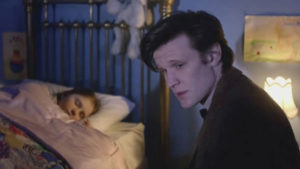 Five of these episodes are the concluding part of an episode twelve. Of the two that aren’t, one tops the list whilst the other makes up the bottom. I’ll make it clear from the off, I don’t like either of them. Of the remainder, the two-parters, The Big Bang holds its position. Perhaps the smallest scale for a finale (set almost exclusively in a museum) turns out to be one of the most epic due to how character driven it is. From one extreme to the other, Journey’s End is next on the list. Arguably this was the largest finale putting all of reality at stake and reuniting all of the Doctor’s companions from that era of the show. The episode also featured characters from Torchwood and The Sarah-Jane Adventures. The Series One finale comes in next with a respectable portion of the vote. Christopher Eccleston’s departure was particularly tragic due to his short lived tenure in the lead role. The narrative of the finale allowed for the Doctor’s character development over the course of the series to be showcased. Doomsday is next and suffers from the Daleks vs Cybermen narrative which turns a lot of the fandom off it. In sixth place we have Last of the Time Lords which also suffers from its narrative, this time the Doctor’s divine resurrection. Two very minor issues, but with the quality of finales, enough to knock them down the list.
Five of these episodes are the concluding part of an episode twelve. Of the two that aren’t, one tops the list whilst the other makes up the bottom. I’ll make it clear from the off, I don’t like either of them. Of the remainder, the two-parters, The Big Bang holds its position. Perhaps the smallest scale for a finale (set almost exclusively in a museum) turns out to be one of the most epic due to how character driven it is. From one extreme to the other, Journey’s End is next on the list. Arguably this was the largest finale putting all of reality at stake and reuniting all of the Doctor’s companions from that era of the show. The episode also featured characters from Torchwood and The Sarah-Jane Adventures. The Series One finale comes in next with a respectable portion of the vote. Christopher Eccleston’s departure was particularly tragic due to his short lived tenure in the lead role. The narrative of the finale allowed for the Doctor’s character development over the course of the series to be showcased. Doomsday is next and suffers from the Daleks vs Cybermen narrative which turns a lot of the fandom off it. In sixth place we have Last of the Time Lords which also suffers from its narrative, this time the Doctor’s divine resurrection. Two very minor issues, but with the quality of finales, enough to knock them down the list.
Russell T Davies Special
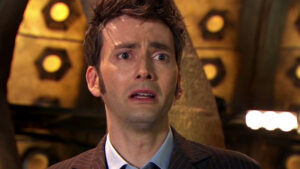 The Davies specials comprised a rather strange poll. As was expected both The Waters of Mars and The End of Time comprised a large share of the vote. This changes the dynamics of the rest of the episode meaning that their percentages are not reflective of their quality of the episode. I doubt anyone would dispute the inclusion of The Waters of Mars, however The End of Time received a much more mixed reception. Personally I love it, my favourite episode of the show. Brilliant moments between the Doctor and Wilf and a whole new approach to regeneration reflective of the Tenth Doctor’s characterisation made the episode for me. Of the Christmas specials there is little difference in their share of the vote. Each has their own merits. The Christmas Invasion removes the Doctor from the narrative leading to a high stakes tense story. The Runaway Bride introduces a future companion and shows the extent to which Rose’s departure affected the Doctor. Voyage of the Damned makes for wonderful family viewing and has a magical feel to it. The Next Doctor whilst the subject of much criticism also has some great moments especially when focusing on the character of Jackson Lake.
The Davies specials comprised a rather strange poll. As was expected both The Waters of Mars and The End of Time comprised a large share of the vote. This changes the dynamics of the rest of the episode meaning that their percentages are not reflective of their quality of the episode. I doubt anyone would dispute the inclusion of The Waters of Mars, however The End of Time received a much more mixed reception. Personally I love it, my favourite episode of the show. Brilliant moments between the Doctor and Wilf and a whole new approach to regeneration reflective of the Tenth Doctor’s characterisation made the episode for me. Of the Christmas specials there is little difference in their share of the vote. Each has their own merits. The Christmas Invasion removes the Doctor from the narrative leading to a high stakes tense story. The Runaway Bride introduces a future companion and shows the extent to which Rose’s departure affected the Doctor. Voyage of the Damned makes for wonderful family viewing and has a magical feel to it. The Next Doctor whilst the subject of much criticism also has some great moments especially when focusing on the character of Jackson Lake.
Steven Moffat Specials
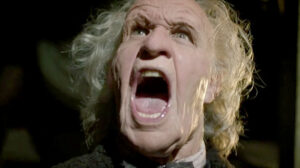 Finally, to conclude the last section of our poll, we have Moffat’s specials. Having already discussed the runaway winner The Day of the Doctor and last place The Doctor, the Widow and the Wardrobe, that leaves only the Christmas Specials to analyse. In second place unsurprisingly is The Time of the Doctor, Matt Smith’s swansong featured long-awaited answers delicately threaded into a narrative which took the Doctor to Trenzalore. A Christmas Carol featured a Doctor Who twist on an old Christmas classic as the Doctor tries to persuade a miserable old man to save the lives of those on a crashing spaceship. The inclusion of Abigail into the narrative makes for heart-breaking viewing. Finally in second last place we have The Snowmen, and introduction to (a) Clara and return for the Great Intelligence. Featuring killer Snowmen and the Paternoster gang, the episode balances fun with emotional impact perfectly to create a memorable Christmas special. I want to reiterate that all five of these episodes are fantastic and there is no shame for a bad position on this list.
Finally, to conclude the last section of our poll, we have Moffat’s specials. Having already discussed the runaway winner The Day of the Doctor and last place The Doctor, the Widow and the Wardrobe, that leaves only the Christmas Specials to analyse. In second place unsurprisingly is The Time of the Doctor, Matt Smith’s swansong featured long-awaited answers delicately threaded into a narrative which took the Doctor to Trenzalore. A Christmas Carol featured a Doctor Who twist on an old Christmas classic as the Doctor tries to persuade a miserable old man to save the lives of those on a crashing spaceship. The inclusion of Abigail into the narrative makes for heart-breaking viewing. Finally in second last place we have The Snowmen, and introduction to (a) Clara and return for the Great Intelligence. Featuring killer Snowmen and the Paternoster gang, the episode balances fun with emotional impact perfectly to create a memorable Christmas special. I want to reiterate that all five of these episodes are fantastic and there is no shame for a bad position on this list.
Concluding Thoughts: By Series
So now we have the complete breakdown of each section of the poll, this allows for deeper analysis into the representation of writers and series within the poll. Granted the format means for an episode to get any votes at all, it must be considered the most exceptional of the set from which it belongs. So how does each series stack up:
|
Series Number |
Average Percentage |
|
Series Four |
17.82% |
|
Series Five |
16.89% |
|
Series Six |
13.80% |
|
Series Seven |
13.34% |
|
Series One |
13.09% |
|
Series Three |
12.97% |
|
Series Two |
12.10% |
What this shows up is rather interesting. To come up with these numbers I have taken the percentage vote for each of the episodes (excluding specials, as the RTD 2009 specials series would interfere) in each series, added them together and divided by thirteen to find an average. This number gives us an appreciation of the quality of a series as a whole whereas the Dream and Nightmare Runs gave us an indication as to which of the 7 series were more hit and miss. As you can see from the table, Donna’s stint in the TARDIS received the highest average vote suggesting it was the most consistently good series. Conversely Series Two takes the bottom spot (not surprisingly) meaning it is the least consistently good series.
RTD era vs Moffat era
 With the numbers above you can now go into the breakdowns of specific eras by averaging the series within each of them. Doing so, the Davies era of the show averages as 14.00% whereas the Moffat Era comes out as 14.67%. I am aware that the debate of RTD vs Moffat is a popular one among fans, so these results are useful in that they show the difference in era over which we argue is only 0.67%. By taking this data and preforming statistical analysis of the two eras of the show we determine that the difference between the two is statistically insignificant, this is rather interesting. If don’t believe me, you can try yourself. I performed an unpaired t-test getting a result that p=0.7194 (I’m aware of my small sample size, but I would have got the same result using each episode individually.) The usually accepted value for statistical significance is p= <0.05. So there you have it, from a statistical point of view both eras of the show are so close that they are not worth arguing about which is better.
With the numbers above you can now go into the breakdowns of specific eras by averaging the series within each of them. Doing so, the Davies era of the show averages as 14.00% whereas the Moffat Era comes out as 14.67%. I am aware that the debate of RTD vs Moffat is a popular one among fans, so these results are useful in that they show the difference in era over which we argue is only 0.67%. By taking this data and preforming statistical analysis of the two eras of the show we determine that the difference between the two is statistically insignificant, this is rather interesting. If don’t believe me, you can try yourself. I performed an unpaired t-test getting a result that p=0.7194 (I’m aware of my small sample size, but I would have got the same result using each episode individually.) The usually accepted value for statistical significance is p= <0.05. So there you have it, from a statistical point of view both eras of the show are so close that they are not worth arguing about which is better.
All Writers
With the series out of the way, now let’s analyse the results per writer using a similar method:
|
Writer |
Average Percentage |
Number of Episodes |
|
Russell T Davies |
10.41% |
31 |
|
Steven Moffat |
24.70% |
25 |
|
Mark Gatiss |
5.78% |
6 |
|
Toby Whithouse |
19.80% |
4 |
|
Paul Cornell |
18.81% |
3 |
|
Tom MacRae |
9.08% |
3 |
|
Helen Raynor |
4.28% |
4 |
|
Neil Gaiman |
20.65% |
2 |
|
Phil Ford |
44.16% |
1 |
|
Robert Shearman |
52.09% |
1 |
|
Chris Chibnall |
3.79% |
3 |
What these numbers mean is not a huge amount in reality. Basically it signifies the percentage chance of a writer delivering a script capable of making its way into a dream run of the show. It’s not an indication of the ability of a writer, especially for Davies and Moffat who have contributed a large number of scripts each which actually ended up competing with each other. As a consequence the percentage for both writers was lowered slightly. Also Moffat has written in more episode slots giving him more opportunities to win and to boost his percentages. Notable here too are the one-hit-wonders who have written just the once for the show, but their episodes are really well received. To cover all the writers for the show would be unnecessary and overkill, so I’ve included the ones I have based on those I thought would be interesting. It does give some sort of indication as to who should come back in future.
That concludes the full analysis of the results of the Face-Off poll. Moffat managed a hugely impressive performance taking the majority of the Dream Run. Can he deliver again when it comes to Series Eight? Let’s hope so.



